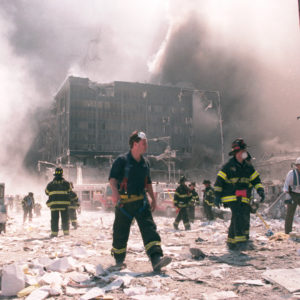After the tragic events of September 11, 2001, Americans collectively searched for answers about who was behind the terror attack and why it occurred. While Osama bin Laden will forever be known as the mastermind of the tragedy, Iran’s role in the devastating attacks, and its collusion with al-Qaida and other terrorist organizations more generally, must not be overlooked.
An early 1990s meeting in Sudan between an emissary of Iran and al-Qaida leader Osama bin Laden, culminated in a decision to put aside Sunni-Shia divisions in favor of an Iran-al-Qaeda pact to conspire against the U.S. As a report by the 9/11 Commission would state, “discussions in Sudan between al-Qaida and Iranian operatives led to an informal agreement to cooperate in … actions carried out primarily against Israel and the United States.”
With the help of Iran, al-Qaida developed a working relationship with Hezbollah, an Iranian terror proxy, supported both monetarily and operationally by Iran’s Islamic Revolutionary Guard Corps (IRGC). In dealings facilitated by Iran, al-Qaida sent a cohort to Hezbollah’s base in Lebanon, where their operatives received training and propaganda instruction. It was even Hezbollah’s Imad Mughniyeh who inspired bin Laden’s signature calling card – coordinated, simultaneous attacks like those seen on September 11.
Iran’s influence on al-Qaeda was confirmed years after the attack. In 2011, Judge George Daniels, presiding over the case where the family members of 9/11 victims sued al-Qaida, the Taliban, and Iran over the 2001 attacks, found that Iran was liable for its involvement. A deciding factor was the testimony of two defectors from Iran’s intelligence service, who testified that Iran had “foreknowledge of the 9/11 attacks” and the regime was “involved in planning” them. Furthermore, Judge Daniels ruled in 2016 that “Iran provided material support or resources … to al-Qaida generally. Such material support or resources took the form of inter alia, planning, funding, facilitation of the hijackers’ travel and training, and logistics, and included the provision of services, money laundering, training, expert advice or assistance, safehouses, false documentation or identification and/or transportation.”
Lastly, a 2011 military raid unearthed letters written by Osama bin Laden stating that “Iran is our main artery for funds, personnel, and communication … There is no need to fight with Iran unless you are forced to.” His letters also revealed that the regime provided haven to al-Qaida after 9/11 writing, “Following the September 11 attacks … they entered Iran swiftly through various routes and not through the official gates. A month later, other brothers joined with their families … it is known that the entry into Iran without a passport is not considered a crime.” These safe havens turned terrorist facilitation hubs allowed for the continued proliferation of al-Qaida. From Iran, al-Qaida operative Abu Musab al-Zarqawi rebuilt the network necessary to later establish the terrorist organization in Iraq. Others still were provided the security to plan and implement terrorist operations as they saw fit.
Fast forward to today and Iran continues to be the world’s leading state sponsor of terrorism. Contrary to the Iranian leadership’s rhetoric portraying itself as a responsible partner in combatting terrorism, just this month, its client Hezbollah cut a reckless deal with ISIS which offered them safe passage to the Iraqi border in eastern Syria. And recently, U.N. Ambassador Nikki Haley accused Iran of illegally smuggling arms to Hezbollah over the course of a decade. Most disturbing against the backdrop of current international affairs is Iran’s persistent nuclear ambitions. .
Next month, President Donald Trump will decide whether to recertify the Joint Comprehensive Plan of Action (JCPOA), also known as the Iran deal. With his decision, he will lend greater clarity to our nation’s approach to a regime that was involved in most devastating terror attack in American history and is also seeking a nuclear weapons capability. As it scrutinizes the JCPOA and grapples with the prospect of a nuclear armed Iran, U.S. policy-makers would be well-served to keep the memory of that dark day sixteen years ago – and Iran’s role – at the forefront of their minds.

